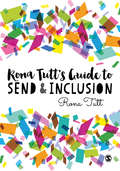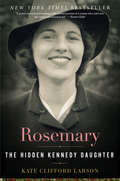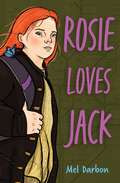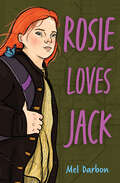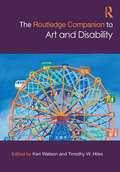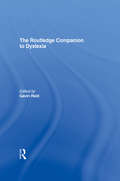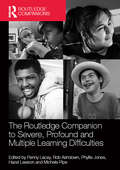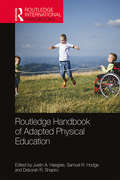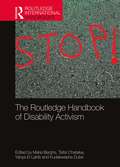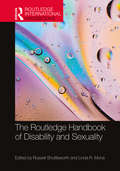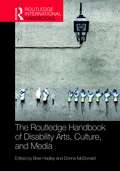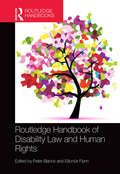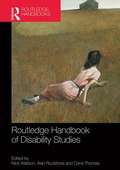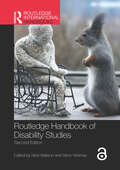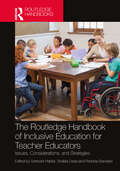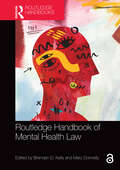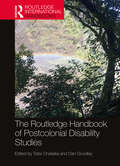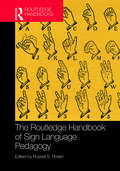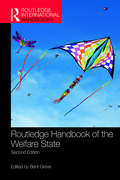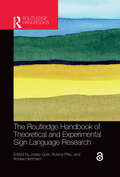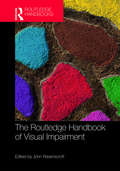- Table View
- List View
Rona Tutt’s Guide to SEND & Inclusion
by Rona TuttHow to give children and young people who have SEN and disabilities (SEND), the support they need in the environment where they feel most fully included, should be a key concern of every teacher and practitioner. Drawing on her years of experience and conversations with a range of professionals, as well as the thoughts of children, young people and families who have encountered a number of settings, SEND expert Dr Rona Tutt examines both the benefits of the recent SEND reforms and also the opportunities that have been missed to meet needs more flexibly. Content focuses on: Creating a climate where all children can thrive An appreciation for the variety of innovative ways school leaders are meeting the needs of students A consideration of the wider context of SEN from local to national level Clear and accessible, this is an inspiring read for anyone concerned with how individual needs are best met, rather than where their education takes place.
Rooster
by Beth Nixon WeaverFifteen-year-old Kady Palmer is burdened with housework and caring for her senile grandmother and mentally handicapped neighbor, so when a rich, handsome boy from school becomes interested in her, she devises a plan to spend time with him.
Rosemary: The Hidden Kennedy Daughter
by Prof. Kate Clifford LarsonThey were the most prominent American family of the twentieth century. The daughter they secreted away made all the difference.<P><P> Joe and Rose Kennedy's strikingly beautiful daughter Rosemary attended exclusive schools, was presented as a debutante to the Queen of England, and traveled the world with her high-spirited sisters. And yet, Rosemary was intellectually disabled -- a secret fiercely guarded by her powerful and glamorous family. Major new sources -- Rose Kennedy's diaries and correspondence, school and doctors' letters, and exclusive family interviews -- bring Rosemary alive as a girl adored but left far behind by her competitive siblings. Kate Larson reveals both the sensitive care Rose and Joe gave to Rosemary and then -- as the family's standing reached an apex -- the often desperate and duplicitous arrangements the Kennedys made to keep her away from home as she became increasingly intractable in her early twenties. Finally, Larson illuminates Joe's decision to have Rosemary lobotomized at age twenty-three, and the family's complicity in keeping the secret. Rosemary delivers a profoundly moving coda: JFK visited Rosemary for the first time while campaigning in the Midwest; she had been living isolated in a Wisconsin institution for nearly twenty years. Only then did the siblings understand what had happened to Rosemary and bring her home for loving family visits. It was a reckoning that inspired them to direct attention to the plight of the disabled, transforming the lives of millions.
Rosie Loves Jack
by Mel DarbonSixteen-year-old Rose Tremayne, who has Down syndrome, attends a program for special-needs students in a London suburb. There she meets Jack, a young man she says "makes the sun shine in my head." Rosie and Jack are devoted to one another, but Jack, who has a traumatic brain injury, has trouble controlling his anger. After he breaks a window in an outburst he is sent to a therapy program in the town of Brighton. Rosie's father seizes the opportunity to end the relationship, but Rose takes matters into her own hands. She sets out on her own to find Jack, leading to a series of harrowing adventures that show her strength and power she never knew she possessed.
Rosie Loves Jack
by Mel DarbonRosie is a sixteen-year-old girl with Down syndrome who's fighting for little freedoms, tolerance, and love."They can't send you away. What will we do? We need us. I stop your angry, Jack. And you make me strong. You make me Rosie."Rosie loves Jack. Jack loves Rosie. So, when they're separated, Rosie will do anything to find the boy who makes the sun shine in her head. Even run away from home. Even struggle across London and travel to Brighton, though the trains are canceled, and the snow is falling. Even though some people might think a girl with Down syndrome could never survive on her own.Introducing a strong, determined, and neurodiverse teen protagonist, debut author Mel Darbon gives readers a unique character experience with a much-needed, alternative point of view. This contemporary young adult novel is a voice-driven, heartfelt story of finding your place in a world that often leaves no room for outsiders.
The Routledge Companion to Art and Disability (Routledge Art History and Visual Studies Companions)
by Keri Watson Timothy W. HilesThe Routledge Companion to Art and Disability explores disability in visual culture to uncover the ways in which bodily and cognitive differences are articulated physically and theoretically, and to demonstrate the ways in which disability is culturally constructed. This companion is organized thematically and includes artists from across historical periods and cultures in order to demonstrate the ways in which disability is historically and culturally contingent. The book engages with questions such as: How are people with disabilities represented in art? How are notions of disability articulated in relation to ideas of normality, hybridity, and anomaly? How do artists use visual culture to affirm or subvert notions of the normative body? Contributors consider the changing role of disability in visual culture, the place of representations in society, and the ways in which disability studies engages with and critiques intersectional notions of gender, race, ethnicity, class, and sexuality. This book will be particularly useful for scholars in art history, disability studies, visual culture, and museum studies.
The Routledge Companion to Art and Disability (Routledge Art History and Visual Studies Companions)
by Keri Watson Timothy W. HilesThe Routledge Companion to Art and Disability explores disability in visual culture to uncover the ways in which bodily and cognitive differences are articulated physically and theoretically, and to demonstrate the ways in which disability is culturally constructed. This companion is organized thematically and includes artists from across historical periods and cultures in order to demonstrate the ways in which disability is historically and culturally contingent. The book engages with questions such as: How are people with disabilities represented in art? How are notions of disability articulated in relation to ideas of normality, hybridity, and anomaly? How do artists use visual culture to affirm or subvert notions of the normative body? Contributors consider the changing role of disability in visual culture, the place of representations in society, and the ways in which disability studies engages with and critiques intersectional notions of gender, race, ethnicity, class, and sexuality.This book will be particularly useful for scholars in art history, disability studies, visual culture, and museum studies.
The Routledge Companion to Dyslexia
by Gavin ReidThe Routledge Companion to Dyslexia is a ground-breaking analysis of the whole field of dyslexia by a distinguished team of international contributors and editors, engaged in literacy, inclusion and learning. Their diverse perspectives and wide expertise make this invaluable guide one of the most important additions to the field of dyslexia for over a decade. Dyslexia is without doubt the most high profile and contentious learning difficulty, and it is a topic that has attracted a vast amount of research, opinion, professional schisms, and debate. The Companion provides an invaluable overview of the field of dyslexia with vital and clear emphasis on linking theoretical perspectives with best practice. This accessible text: presents a survey of current and future development in research, with a focus on how research can inform practice focuses on areas such as neurobiology, phonological processing, literacy acquisition, numeracy and multilingualism considers assessment and identification, with contributions on early identification, reading, spelling and mathematics addresses identifying and meeting needs in an inclusive context discusses inclusion and barriers to learning in a variety of different national contexts includes models of instruction, direct instruction, co-operative learning and cross-curricular learning. The Routledge Companion to Dyslexia is a superb resource for anyone interested in the subject, whether in education or related subjects such as psychology or neurology. Fully indexed and cross-referenced, with helpful further reading sections at the end of each entry, it is ideal for those coming to the field of dyslexia for the first time as well as students and practitioners already familiar with the subject.
The Routledge Companion to Severe, Profound and Multiple Learning Difficulties
by Penny Lacey Phyllis Jones Rob Ashdown Hazel Lawson Michele PipeThe Routledge Companion to Severe, Profound and Multiple Learning Difficulties is a timely and rich resource with contributions from writing teams of acknowledged experts providing a balance of both academic and practitioner perspectives. The book covers a myriad of topics and themes and has the core purpose of informing and supporting everyone who is interested in improving the quality of education and support for children and young adults with severe, profound and multiple learning difficulties and their families. Each chapter contains careful presentations and analyses of the findings from influential research and its practical applications and the book is a treasure chest of experiences, suggestions and ideas from practitioners that will be invaluable for many years to come. The chapters include many vignettes gathered from practitioners in the field and are written specifically to be rigorous yet accessible. The contributors cover topics related to the rights and needs of children and young adults from 0-25 years, crucial features of high quality education, characteristics of integrated provision and effective and sensitive working with families to ensure the best possible outcomes for their children. Crucially, the voice of the learners themselves shines through. Historical provision that has had an impact on developing services and modern legislation aimed at improving provision and services are also discussed. The contributed chapters are organised into six themed parts: Provision for learners with SLD/PMLD. Involving stakeholders. Priorities for meeting the personal and social needs of learners. Developing the curriculum. Strategies for supporting teaching and learning. Towards a new understanding of education for learners with SLD/PMLD. This text is an essential read for students on courses and staff working in and with the whole range of educational settings catering for children and young adults with severe, profound and multiple learning difficulties, not just for teachers but also for support staff, speech and language therapists, physiotherapists, psychologists, nurses, social workers and other specialists.
Routledge Handbook of Adapted Physical Education (Routledge International Handbooks)
by Justin A. Haegele Samuel R. Hodge Deborah R. ShapiroThis handbook represents the first comprehensive and evidence-based review of theory, research, and practice in the field of adapted physical education (APE). Exploring philosophical and foundational aspects of APE, the book outlines the main conceptual frameworks informing research and teaching in this area, and presents important material that will help shape best practice and future research. Written by world-leading researchers, the book introduces the key themes in APE, such as historical perspectives on disability, disability and the law, language, and measurement. It examines the most significant theoretical frameworks for understanding APE, from embodiment and social cognitive theory to occupational socialization, and surveys current debates and practical issues in APE, such as teacher training, the use of technology, and physical inactivity and health. Acknowledging the importance of the voices of children, parents and peers, the book also explores research methods and paradigms in APE, with each chapter including directions for further research. Offering an unprecedented wealth of material, the Routledge Handbook of Adapted Physical Education is an essential reference for advanced students, researchers and scholars working in APE, and useful reading for anybody with an interest in disability, physical education, sports coaching, movement science or youth sport.
The Routledge Handbook of Disability Activism (Routledge International Handbooks)
by Maria Berghs Tsitsi Chaitaka Yayha El-Lahib Andrew DubeThe onslaught of neoliberalism, austerity measures and cuts, impact of climate change, protracted conflicts and ongoing refugee crisis, rise of far right and populist movements have all negatively impacted on disability. Yet, disabled people and their allies are fighting back and we urgently need to understand how, where and what they are doing, what they feel their challenges are and what their future needs will be. This comprehensive handbook emphasizes the importance of everyday disability activism and how activists across the world bring together a wide range of activism tactics and strategies. It also challenges the activist movements, transnational and emancipatory politics, as well as providing future directions for disability activism. With contributions from senior and emerging disability activists, academics, students and practitioners from around the globe, this handbook covers the following broad themes: • Contextualising disability activism in global activism • Neoliberalism and austerity in the global North • Rights, embodied resistance and disability activism • Belonging, identity and values: how to create diverse coalitions for rights • Reclaiming social positions, places and spaces • Social media, support and activism • Campus activism in higher education • Inclusive pedagogies, evidence and activist practices • Enabling human rights and policy • Challenges facing disability activism The Routledge Handbook of Disability Activism provides disability activists, students, academics, practitioners, development partners and policy makers with an authoritative framework for disability activism.
The Routledge Handbook of Disability and Sexuality (Routledge International Handbooks)
by Russell Shuttleworth and Linda R. MonaThis handbook provides a much-needed holistic overview of disability and sexuality research and scholarship. With authors from a wide range of disciplines and representing a diversity of nationalities, it provides a multi-perspectival view that fully captures the diversity of issues and outlooks. Organised into six parts, the contributors explore long-standing issues such as the psychological, interpersonal, social, political and cultural barriers to sexual access that disabled people face and their struggle for sexual rights and participation. The volume also engages issues that have been on the periphery of the discourse, such as sexual accommodations and support aimed at facilitating disabled people's sexual well-being; the socio-sexual tensions confronting disabled people with intersecting stigmatised identities such as LGBTBI or asexual; and the sexual concerns of disabled people in the Global South. It interrogates disability and sexuality from diverse perspectives, from more traditional psychological and sociological models, to various subversive and post-theoretical perspectives and queer theory. This handbook examines the cutting-edge, and sometimes ethically contentious, concerns that have been repressed in the field. With current, international and comprehensive content, this book is essential reading for students, academics and researchers in the areas of disability, gender and sexuality, as well as applied disciplines such as healthcare practitioners, counsellors, psychology trainees and social workers.
The Routledge Handbook of Disability Arts, Culture, and Media
by Bree Hadley Donna McDonaldIn the last 30 years, a distinctive intersection between disability studies – including disability rights advocacy, disability rights activism, and disability law – and disability arts, culture, and media studies has developed. The two fields have worked in tandem to offer critique of representations of disability in dominant cultural systems, institutions, discourses, and architecture, and develop provocative new representations of what it means to be disabled. Divided into 5 sections: Disability, Identity, and Representation Inclusion, Wellbeing, and Whole-of-life Experience Access, Artistry, and Audiences Practices, Politics and the Public Sphere Activism, Adaptation, and Alternative Futures this handbook brings disability arts, disability culture, and disability media studies – traditionally treated separately in publications in the field to date – together for the first time. It provides scholars, graduate students, upper level undergraduate students, and others interested in the disability rights agenda with a broad-based, practical and accessible introduction to key debates in the field of disability art, culture, and media studies. An internationally recognised selection of authors from around the world come together to articulate the theories, issues, interests, and practices that have come to define the field. Most critically, this book includes commentaries that forecast the pressing present and future concerns for the field as scholars, advocates, activists, and artists work to make a more inclusive society a reality.
Routledge Handbook of Disability Law and Human Rights
by Peter Blanck Eilionóir FlynnThis handbook provides a comprehensive and authoritative state-of-the-art review of the current and emerging research and policy on disability law. Bringing together a team of respected and experienced experts, the handbook offers a range of jurisdictional and multidisciplinary perspectives. The authors consider historical and contemporary, as well as comparative perspectives of disability law. Divided into three parts, the contributors provide a comprehensive reference to the theoretical underpinnings, ongoing debates and emerging fields within the subject. The study provides a strong basis for consideration of contemporary disability law, its research foundations, and progressive developments in the area. The book incorporates interdisciplinary and comparative country perspectives to capture the breadth of current discourse on disability law. This handbook provides a valuable resource for a wide range of scholars, public and private researchers, NGOs, and practitioners working in the area of disability law, and across national and transnational disability schemes. The work will be of important interest to those in the fields of sociology, history, psychology, economics, political science, rehabilitation sciences, medicine, technology, and law, among others.
Routledge Handbook of Disability Studies
by Carol Thomas Nick Watson Alan RoulstoneThe Routledge Handbook of Disability Studies takes a multidisciplinary approach to disability and provides an authoritative and up-to-date overview of the main issues in the field around the world today. Adopting an international perspective and consisting entirely of newly commissioned chapters arranged thematically, it surveys the state of the discipline, examining emerging and cutting edge areas as well as core areas of contention. Divided in five sections, this comprehensive handbook covers: different models and approaches to disability how key impairment groups have engaged with disability studies and the writings within the discipline policy and legislation responses to disability studies and to disability activism disability studies and its interaction with other disciplines, such as history, philosophy and science and technology studies disability studies and different life experiences, examining how disability and disability studies intersects with ethnicity, sexuality, gender, childhood and ageing. Containing chapters from an international selection of leading scholars, this authoritative handbook is an invaluable reference for all academics, researchers and more advanced students in disability studies and associated disciplines such as sociology, health studies and social work.
Routledge Handbook of Disability Studies
by Nick Watson Simo VehmasThis fully revised and expanded second edition of the Routledge Handbook of Disability Studies takes a multidisciplinary approach to disability and provides an authoritative and up-to-date overview of the main issues in the field around the world today. Adopting an international perspective and arranged thematically, it surveys the state of the discipline, examining emerging and cutting-edge areas as well as core areas of contention. Divided in five parts, this comprehensive handbook covers: Different models and approaches to disability. How key impairment groups have engaged with disability studies and the writings within the discipline. Policy and legislation responses to disability studies and to disability activism. Disability studies and its interaction with other disciplines, such as history, philosophy, sport, and science and technology studies. Disability studies and different life experiences, examining how disability and disability studies intersects with ethnicity, sexuality, gender, childhood and ageing. Containing 15 revised chapters and 12 new chapters from an international selection of leading scholars, this authoritative handbook is an invaluable reference for all academics, researchers, and more advanced students in disability studies and associated disciplines such as sociology, health studies and social work.
Routledge Handbook of Disability Studies
by Nick Watson Simo VehmasThis fully revised and expanded second edition of the Routledge Handbook of Disability Studies takes a multidisciplinary approach to disability and provides an authoritative and up-to-date overview of the main issues in the field around the world today. Adopting an international perspective and arranged thematically, it surveys the state of the discipline, examining emerging and cutting-edge areas as well as core areas of contention.Divided in five parts, this comprehensive handbook covers: Different models and approaches to disability. How key impairment groups have engaged with disability studies and the writings within the discipline. Policy and legislation responses to disability studies and to disability activism. Disability studies and its interaction with other disciplines, such as history, philosophy, sport, and science and technology studies. Disability studies and different life experiences, examining how disability and disability studies intersects with ethnicity, sexuality, gender, childhood and ageing. Containing 15 revised chapters and 12 new chapters from an international selection of leading scholars, this authoritative handbook is an invaluable reference for all academics, researchers, and more advanced students in disability studies and associated disciplines such as sociology, health studies and social work.Chapter 6 of this book is freely available as a downloadable Open Access PDF at http://www.taylorfrancis.com under a Creative Commons Attribution-Non Commercial-No Derivatives (CC-BY-NC-ND) 4.0 license.
The Routledge Handbook of Inclusive Education for Teacher Educators: Issues, Considerations, and Strategies
by Santoshi Halder, Shakila Dada and Rashida BanerjeeThis handbook provides foundational, conceptual, and practical knowledge and understanding of inclusive education and special needs education. It highlights the need for preparing special educators and teachers for inclusive classrooms to effectively cater to the needs of students with diverse needs in various low-, middle-, and high-income countries globally. It demonstrates various evidence-based and practice-based strategies required to create classrooms inclusive of diverse learners. While tracing the historical trajectory of the foundational underpinnings, philosophical bases, and crucial issues associated with inclusive education, this book presents a future roadmap and pathways through case instances and in-depth discussions to share with educators how they can strengthen their bases and make learning more inclusive in their context. It also provides an overview of the different models of assessment and their applications in the analysis of children in inclusive classroom settings. Comprehensive, accessible, and nuanced, this handbook will be of immense interest and benefit to teachers, educators, special educators, students, scholars, and researchers in the areas of social inclusion, education, special needs education, educational psychology, technology for inclusion, disability studies, among other related disciplines. It will be extremely beneficial for academicians, teacher educators, special educators, and those interested in professional teacher training courses.
Routledge Handbook of Mental Health Law (Routledge Handbooks in Law)
by Brendan D. Kelly and Mary DonnellyMental health law is a rapidly evolving area of practice and research, with growing global dimensions. This work reflects the increasing importance of this field, critically discussing key issues of controversy and debate, and providing up-to-date analysis of cutting-edge developments in Africa, Asia, Europe, the Americas, and Australia. This is a timely moment for this book to appear. The United Nations’ Convention on the Rights of Persons with Disabilities (2006) sought to transform the landscape in which mental health law is developed and implemented. This Convention, along with other developments, has, to varying degrees, informed sweeping legislative reforms in many countries around the world. These and other developments are discussed here. Contributors come from a wide range of countries and a variety of academic backgrounds including ethics, law, philosophy, psychiatry, and psychology. Some contributions are also informed by lived experience, whether in person or as family members. The result is a rich, polyphonic, and sometimes discordant account of what mental health law is and what it might be. The Handbook is aimed at mental health scholars and practitioners as well as students of law, human rights, disability studies, and psychiatry, and campaigners and law- and policy-makers.
Routledge Handbook of Mental Health Law (Routledge Handbooks in Law)
by Brendan D. Kelly and Mary DonnellyMental health law is a rapidly evolving area of practice and research, with growing global dimensions. This work reflects the increasing importance of this field, critically discussing key issues of controversy and debate, and providing up-to-date analysis of cutting-edge developments in Africa, Asia, Europe, the Americas, and Australia.This is a timely moment for this book to appear. The United Nations’ Convention on the Rights of Persons with Disabilities (2006) sought to transform the landscape in which mental health law is developed and implemented. This Convention, along with other developments, has, to varying degrees, informed sweeping legislative reforms in many countries around the world. These and other developments are discussed here. Contributors come from a wide range of countries and a variety of academic backgrounds including ethics, law, philosophy, psychiatry, and psychology. Some contributions are also informed by lived experience, whether in person or as family members. The result is a rich, polyphonic, and sometimes discordant account of what mental health law is and what it might be.The Handbook is aimed at mental health scholars and practitioners as well as students of law, human rights, disability studies, and psychiatry, and campaigners and law- and policy-makers.
The Routledge Handbook of Postcolonial Disability Studies (Routledge International Handbooks)
by Tsitsi Chataika Dan GoodleyThis book centres and explores postcolonial theory, which looks at issues of power, economics, politics, religion and culture and how these elements work in relation to colonial supremacy. It argues that disability is a constitutive material presence in many postcolonial societies and that progressive disability politics arise from postcolonial concerns. By drawing these two subjects together, this handbook challenges oppression, voicelessness, stereotyping, undermining, neo-colonisation and postcolonisation and bridges binary debate between global North and the global South.The book is divided into eight sectionsi Setting the Sceneii Decolonising Disability Studiesiii Postcolonial Theory, Inclusive Developmentiv Postcolonial Disability Studies and Disability Activismv Postcolonial Disability and Childhood Studiesvi Postcolonial Disability Studies and Educationvii Postcolonial Disability Studies, Gender, Race and Religionviii ConclusionAnd comprised of 27 newly written chapters, this book leads with postcolonial perspectives – closely followed by an engagement with critical disability studies – with the explicit aim of foregrounding these contributions; pulling them in from the edges of empirical and theoretical work where they often reside in mainstream academic literature.The book will be of interest to all scholars and students of disability studies and postcolonial studies as well as those working in sociology, literature and development studies.
The Routledge Handbook of Sign Language Pedagogy (Routledge Language Handbooks)
by Russell S. RosenThe Routledge Handbook of Sign Language Pedagogy is the first reference of its kind, presenting contributions from leading experts in the field of sign language pedagogy. The Handbook fills a significant gap in the growing field of sign language pedagogy, compiling all essential aspects of current trends and empirical research in teaching, curricular design, and assessment in one volume. Each chapter includes historical perspectives, core issues, research approaches, key findings, pedagogical implications, future research direction, and additional references. The Routledge Handbook of Sign Language Pedagogy is an essential reference for sign language teachers, practitioners, and researchers in applied sign linguistics and first, second, and additional language learning.
Routledge Handbook of the Welfare State (Routledge International Handbooks)
by Bent GreveForty-five contributions from renowned international specialists in the field provide readers with expert analysis of the core issues related to the welfare state, including regional depictions of welfare states around the globe. The second edition of the Routledge Handbook of the Welfare State combines essays on methodologies, core concepts and central policy areas to produce a comprehensive understanding of what ‘the welfare state’ means around the world. In the aftermath of the credit crunch, the Handbook addresses some of the many questions about the welfare state. This second edition has been thoroughly revised and updated to include an in-depth analysis of societal changes in recent years. New articles can be found on topics such as: the impact of ideas, well-being, migration, globalisation, India, welfare typologies, homelessness and long-term care. This volume will be an invaluable reference book for students and scholars throughout the social sciences, particularly in sociology, social policy, public policy, international relations, politics and gender studies.
The Routledge Handbook of Theoretical and Experimental Sign Language Research (Routledge Handbooks in Linguistics)
by Josep QuerThe Routledge Handbook of Theoretical and Experimental Sign Language Research bridges the divide between theoretical and experimental approaches to provide an up-to-date survey of key topics in sign language research. With 29 chapters written by leading and emerging scholars from around the world, this Handbook covers the following key areas: On the theoretical side, all crucial aspects of sign language grammar studied within formal frameworks such as Generative Grammar; On the experimental side, theoretical accounts are supplemented by experimental evidence gained in psycho- and neurolinguistic studies; On the descriptive side, the main phenomena addressed in the reviewed scholarship are summarized in a way that is accessible to readers without previous knowledge of sign languages. Each chapter features an introduction, an overview of existing research, and a critical assessment of hypotheses and findings. The Routledge Handbook of Theoretical and Experimental Sign Language Research is key reading for all advanced students and researchers working at the intersection of sign language research, linguistics, psycholinguistics, and neurolinguistics.
The Routledge Handbook of Visual Impairment: Social and Cultural Research (Routledge International Handbooks)
by John RavenscroftThe Routledge Handbook of Visual Impairment examines current debates as well as cross-examining traditionally held beliefs around visual impairment. It provides a bridge between medical practice and social and cultural research drawing on authentic investigations. It is the intention of this Handbook to provide an opportunity to engage with academic researchers who wish to ensure a coherent and rigorous approach to research construction and reflection on visual impairment that is in collaboration with, but sometimes is beyond, the medical realm. This Handbook is divided into ten thematic areas in order to represent the wide range of debates and concepts within visual impairment. The ten themes include: cerebral visual impairment; education; sport and physical exercise; assistive technology; understanding the cultural aesthetics; socio-emotional and sexual aspects of visual impairment; orientation, mobility, habitation, and rehabilitation; recent advances in "eye" research and sensory substitution devices; ageing and adulthood. The 27 chapters that explore the social and cultural aspects of visual impairment can be taken and used in a variety of different ways in order to promote research and generate debate among practitioners and scholars who wish to use this resource to inform their practice in supporting and developing positive outcomes for all.
